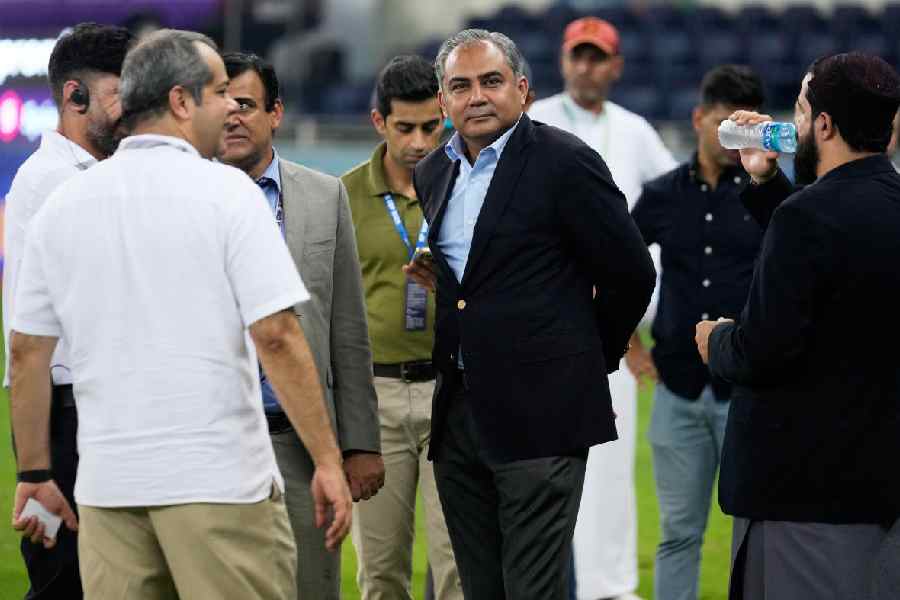New Delhi, Nov. 27: In an intelligent blend of political acumen and suave diplomacy, Awami League leader Sheikh Hasina today made a clear distinction between Bangladesh and the ruling Bangladesh Nationalist Party government, led by her arch rival, Begum Khaleda Zia.
Criticising the BNP government’s political vendetta against Awami supporters, who included a large number of religious minorities, Hasina stayed clear of charges that her country has become a safe haven for Pakistan’s Inter-Services Intelligence and militants of the al Qaida.
“We have seen such reports in newspapers. But independently, we don’t have any information about them. Maybe the question should be directed to the Bangladesh government,” the former Bangladesh Prime Minister said. Hasina was replying to questions at a meet-the-press programme, organised by the Foreign Correspondents Club of India this afternoon.
Though Hasina remained silent on the subject, Indian foreign minister Yashwant Sinha told Parliament today that the Pakistan high commission in Dhaka had become the “nerve-centre of ISI activities”.
It may be more than just a coincidence that a private dinner was hosted by Sinha for the Awami leader last night at Hyderabad House. Hasina, with a few select aides, also had a closed-door meeting with Prime Minister Atal Bihari Vajpayee yesterday afternoon. Today, she called on President A.P.J. Abdul Kalam at Rashtrapati Bhavan.
“It was just a courtesy call,” Hasina said, when asked about her meetings with the Indian leaders. “I am a leader of the Opposition in Bangladesh and we discussed many bilateral issues.”
The former Prime Minister, however, chose to publicise only the huge trade deficit between the two sides and Dhaka’s demand for freer access to the Indian market, to the media.
Hasina’s cautious approach is a clear indication that she would not like to say anything controversial here — specially about the growth of the al Qaida and ISI activities in Bangladesh, which have received wide coverage in the western media — for which she might be hauled up by the BNP.
There are apprehensions in Dhaka that the adverse publicity the country has received over the past few months regarding the growth of terrorists and religious fundamentalists may jeopardise its developmental aid from western donors. By refraining from making any fresh accusations in this connection, the Awami leader proved that even in the Opposition, she had the country’s interest in mind.
Hasina also showed a slight shift from her stated position on the export of Bangladeshi gas to India. She made it clear that there was an over-estimation of the gas reserves of Bangladesh. “Whatever gas is found, it should first be used for Bangladesh. If there is a surplus, a decision can be taken for exporting it,” she added.
Days before Hasina left, she had given a call for deploying the army to guard the gasfields of Bangladesh as she feared that the BNP government might otherwise sell them off to India. Bangladesh stands to gain at least $300 million per year if it sells 500 million cubic feet of gas to India per day.
There is also pressure on Dhaka from some western countries to reach an agreement with Delhi as foreign investment for exploring Bangladesh’s gas can come only if investors are assured of an Indian market. The moderation shown by Hasina on the export of Bangladeshi gas, therefore, indicates that while she is keen to shrug off her pro-Indian tag, she will not like to take it to an extent where her country stands to lose.
The only time Hasina decided to bare her fangs was when she spoke about the BNP’s attack on the Awami. “Our workers are being harassed and arrested. They have unleashed a series of attacks on us. They want to eliminate their political opponents in Bangladesh,” she said, accusing the Khaleda government of using police and military force against Awami activists.
Repeating her call for a mid-term election in Bangladesh, the former Prime Minister said: “The law and order situation has totally collapsed. The BNP government was forced to call in the army to save the situation. The international community should take note of the situation.”










